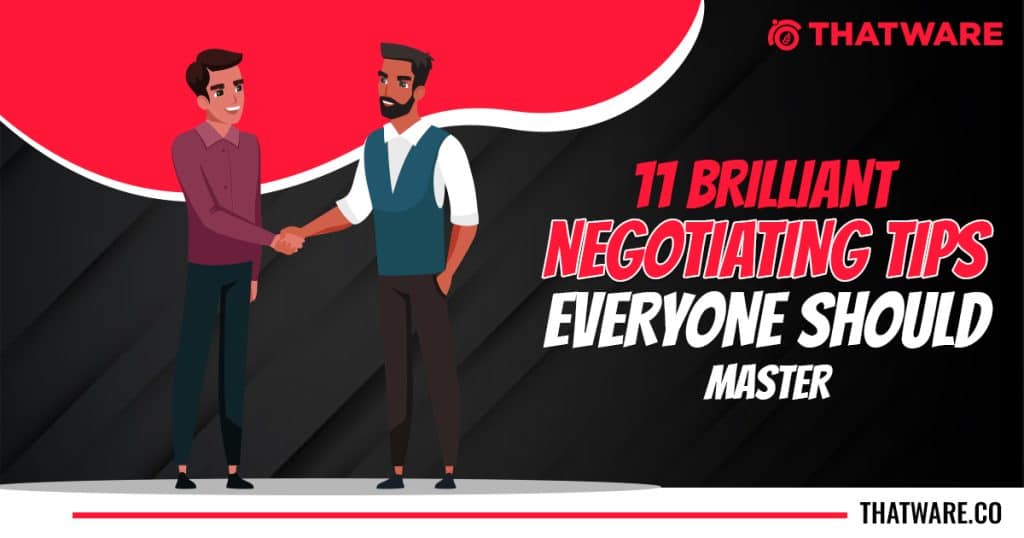Get a Customized Website SEO Audit and Online Marketing Strategy and Action
It’s natural to believe that you’re “poor at bargaining” Because the thought of negotiating makes many of us feel uneasy, embarrassed, or worried.
Human connection is at the heart of negotiation. Negotiations are about building connections that lead to the greatest outcome for everyone, not about dollars and cents, agreement conditions, or winning.

You’re always trying to get the greatest deal for yourself, whether looking to purchase a car, earn a raise, or locate discounts at garage sales. However, not everyone is a skilled negotiator. We were intrigued as to why some people seem to have an uncanny ability to achieve what they desire while others don’t. So we compiled the most recent studies on negotiating methods to see what science has to say.
1️) Go For The Win/Win Situation
Successful negotiation is achieved when both parties’ needs are fulfilled. When fulfilling the needs of others, you are allowing them to walk away feeling good. Focus on the win/win outcome! That is, make sure each party walks away with getting what they want.
When both parties are happy with their agreement in a win-win negotiation, the chances of long-term success are substantially better. Finding your way to a win-win situation frequently entails achieving mutual advantages by trading off your opposing preferences to produce value.
2) Make The First Move
Making the first move helps you establish the field in which you play.
Making the first move, in particular, might assist you in setting the bounds of the negotiating zone. In other words, by starting the negotiation, you may manage the other side’s expectations and guarantee that you determine the rules of the debate.
You gain command of the field. You inform the other party of what is and is not within the scope of possibilities. Even if your initial step does not represent the scope of your offer, you have gained control of the conversation. While the opposing party may ignore your initial move, they will be compelled to consider the limitations you provide.
3) Be Fun To Work With
It might be difficult to strike a deal if you are being difficult. Many negotiations are unsuccessful because people can be rude, nasty or disrespectful during the negotiation process.
If you are fun to work with, it becomes a crucial motivation for others, vital for employee engagement, creativity, and team development. Even hybrid or remote teams might benefit from having fun working with you.
4) Make The Other Person Feel Connected
Connecting with others, networking and creating fulfilling relationships that positively influence your life can be one of the best things you do. Focus on others, be genuine and listen as much as you speak.
In negotiation, establish a relationship by asking questions and then listening closely. Even if you have decided to make the first offer and have several options prepared, you should always begin by asking and listening to gauge your counterpart’s interests. It’s important to note that if your listening technique isn’t compassionate enough, it won’t inspire honest replies.
In negotiation, a connection is a perceived link that might be psychological, economic, political, or personal; whatever its foundation, smart leaders, like competent negotiators, try to build a strong connection since effective leadership depends on it.
5) Do Your Homework
We all know we should prepare extensively for negotiations, yet we frequently fail to follow through on our best intentions. This is a major issue: research reveals that unprepared negotiators make needless compromises, neglect sources of value, and walk away from favourable accords. The most effective move you could take to enhance your bargaining abilities is to prepare carefully for critical meetings.
Preparation is key to negotiation success. Learn as much as possible beforehand about the needs and interests of both parties at the table.
The more information you have, the stronger you will be in the negotiation.
6) You Can’t Get It If You Don’t Ask For It
Go high! Ask for it. Everything is a deal. Ask even if you don’t think you can obtain it; you’ll be closer to getting it if you do. Your final reward will be greater the higher your goals are.
Our demands are more or less comparable at the heart of all human activity. A positive experience is simple to manage. We all, by definition, suffer from unpleasant experiences. As a result, what we receive out of life is dictated not by the wonderful experiences we seek but by the awful feelings we are ready and able to endure to get those good feelings.
7) Have A Solid Bottom Line
Like the top line, the bottom line is displayed on your profit and loss or income statement, but it is at the absolute bottom. It displays your company’s net revenue after deducting everything from your gross sales, such as the cost of your sold items and services, administrative expenditures, wages, and overhead.
Make a plan in advance and decide what’s most important. Below this point, it would be preferable for you to end the conversation than to reach an agreement. If it comes to that, be prepared to go! Having a predetermined bottom line offers you negotiating power.
Bottom-line growth indicates that you have reduced your operating costs and overhead to enhance the figure at the bottom of your profit and loss statement.
8) Have Great Communication Skills
To achieve your ideal outcome at the bargaining table, you must communicate what you’re hoping to walk away with and where your boundaries lie.
Effective communication is essential for building trust, aligning efforts toward common goals, and inspiring positive change. Important information might be misread when inadequate communication, leading relationships to deteriorate and generating hurdles that impede development.
9) Emotional Intelligence
Emotions play a role in negotiation, for better or worse. While it’s important not to let them get in the way of reaching a mutually beneficial deal, you can use them to your advantage.
Emotional intelligence (EQ) is the capacity to constructively comprehend, use, and control one’s emotions to reduce stress, communicate effectively, empathize with others, overcome problems, and diffuse conflict.
Emotional intelligence assists you in developing stronger connections, succeeding in school and at work, and achieving your professional and personal objectives. It can also assist you in connecting with your feelings, translating purpose into action, and making educated judgments about what is most important to you.
10) Have A Backup Plan
You must have a backup strategy.
Setting a goal necessitates creating a strategy and sticking to it to attain your objectives. If you see that things aren’t going as planned, don’t just give up and abandon the aim. Instead, consider your next step or a backup strategy, your Plan B, for reaching that goal.
Without a backup plan, you will be forced to accept the terms of any deal, regardless of how unsatisfactory they are. Choose the most advantageous replacement for a negotiated agreement.
A strategy with contingencies as a backup plan is not focused on failure. I think preparing yourself to be more successful will prepare you to know how to react to any roadblocks before they appear.
11) Do The Right Thing
Sometimes it seems that the easy way is the best path to follow, but don’t be fooled by short-term gains.
When in doubt, always do what is right for everyone involved. This is a powerful mechanism that strengthens your integrity.

Thatware | Founder & CEO
Tuhin is recognized across the globe for his vision to revolutionize digital transformation industry with the help of cutting-edge technology. He won bronze for India at the Stevie Awards USA as well as winning the India Business Awards, India Technology Award, Top 100 influential tech leaders from Analytics Insights, Clutch Global Front runner in digital marketing, founder of the fastest growing company in Asia by The CEO Magazine and is a TEDx speaker and BrightonSEO speaker.


